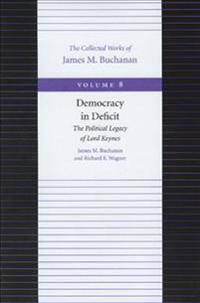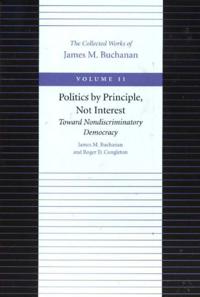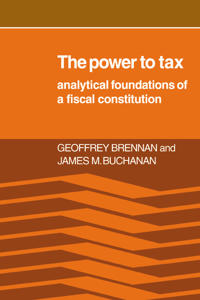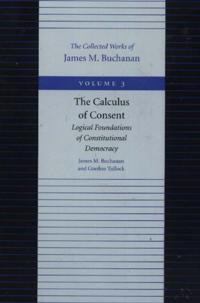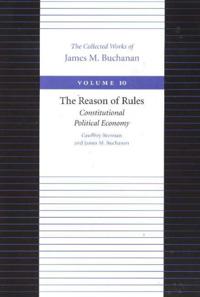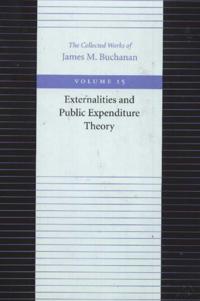Konstitutioner, politik och frihet : James Buchanan i urval (Pocket)
avJames Buchanan
ISBN: 9789175669489 - UTGIVEN: 2013-12-16Vilka politiska spelregler ska man enas om för att kunna få förnuftiga politiska beslut? Vad händer med beslutsfattandet när lagstiftarna själva deltar i det politiska spelet och har sina egna intressen att bevaka? James Buchanan (19192013) var en av pionjärerna bakom public choice-skolan, so[...]
James Buchanan: The American Presidents Series: The 15th President, 1857-1861 (Inbunden)
avJean H. Baker, Arthur Meier Schlesinger, Arthur Meier Schlesinger
ISBN: 9780805069464 - UTGIVEN: 2004-06A thought-provoking look at the presidency of James Buchanan, whose administration paved the way for the onslaught of the Civil War, details his failures as a president--his inability to resolve the issue of slavery, his lack of compromise, his weak leadership in a time of national crisis, and more.[...]
Konstitutioner, politik och frihet. James Buchanan i urval
ISBN: 9789175669960 - UTGIVEN: 2013-12Vilka politiska spelregler ska man enas om för att kunna få förnuftiga politiska beslut? Vad händer med beslutsfattandet när lagstiftarna själva deltar i det politiska spelet och har sina egna intressen att bevaka? James Buchanan (19192013) var en av pionjärerna bakom public choice-skolan, so[...]
Democracy in Deficit (Inbunden)
avJames M. Buchanan, Richard E. Wagner, James M. Buchanan
ISBN: 9780865972278 - UTGIVEN: 2000-07Democracy in Deficit opened the door for much of the current work on political business cycles and the incorporation of public-choice considerations into macroeconomic theory. Even in the area of monetarism, Buchanan's landmark work has greatly influenced the sway of contemporary theorists away from[...]
Democracy in Deficit (Pocket)
avJames M. Buchanan, Richard E. Wagner, James M. Buchanan
ISBN: 9780865972285 - UTGIVEN: 2000-03Democracy in Deficit opened the door for much of the current work on political business cycles and the incorporation of public-choice considerations into macroeconomic theory. Even in the area of monetarism, Buchanan's landmark work has greatly influenced the sway of contemporary theorists away from[...]
Politics by Principles, Not Interest (Pocket)
avJames M. Buchanan, Roger D. Congleton, James M. Buchanan
ISBN: 9780865972346 - UTGIVEN: 2003-06"Politics by principle is that which modern politics is not. What we observe is 'politics by interest', whether in the form of explicitly discriminatory treatment (rewarding or punishing) of particular groupings of citizens or of some elitist-dirigiste classification of citizens into the deserving o[...]
The Limits of Liberty (Häftad)
avJames M. Buchanan
ISBN: 9780226078205 - UTGIVEN: 197702""The Limits of Liberty" is concerned mainly with two topics. One is an attempt to construct a new contractarian theory of the state, and the other deals with its legitimate limits. The latter is a matter of great practical importance and is of no small significance from the standpoint of political [...]
The Power to Tax (Häftad)
avGeoffrey Brennan, James M. Buchanan
ISBN: 9780521027922 - UTGIVEN: 200611Should government's power to tax be limited? The events of the late 1970s in the wake of California's Proposition 13 brought this question very sharply into popular focus. Whether the power to tax should be restricted, and if so how, are issues of immediate policy significance. Providing a serious a[...]
The Reason of Rules (Häftad)
avGeoffrey Brennan, James M. Buchanan
ISBN: 9780521070904 - UTGIVEN: 200808Societies function on the basis of rules. These rules, rather like the rules of the road, coordinate the activities of individuals who have a variety of goals and purposes. Whether the rules work well or ill, and how they can be made to work better, is a matter of major concern. Appropriately interp[...]
The Public Principles of Public Debt (Häftad)
avJames M. Buchanan
ISBN: 9780865972162 - UTGIVEN: 199901One of Buchanan's most important and influential books. The radical idea he conceived was that: our reliance on public debt has amassed a sort of orthodoxy that is commonly -- and needlessly -- assumed by taxpayers, by politicians, and by economists themselves. Buchanan dismisses the nearly univers[...]
The Calculus of Consent (Häftad)
avJames M. Buchanan, Gordon Tullock, Charles Kershaw Rowie
ISBN: 9780865972186 - UTGIVEN: 199901THE CALCULUS OF CONSENT was co-authored by Buchanan with Gordon Tullock, with whom Buchanan collaborated on many books and academic enterprises throughout their careers. As Robert D Tollison states in the foreword: (this book) is a radical departure from the way democracies conduct their business. T[...]
The Public Finance in Democratic Process (Inbunden)
avJames M. Buchanan
ISBN: 9780865972193 - UTGIVEN: 199901A monumental work that outlines the dynamics of individual choice as it is displayed in the process of public finance. Buchanan is perhaps nowhere more clearly a disciple of the great Swedish economist Knut Wicksell than he is in the underlying principles of this seminal work. Specifically, he elabo[...]
The Reason of Rules (Inbunden)
avGeoffrey Brennan, James M. Buchanan, Geoffrey Brennan
ISBN: 9780865972315 - UTGIVEN: 2000-07In his foreword, Robert D Tollison identifies the main objective of Geoffrey Brennan and James M Buchanan's "The Reason of Rules": "...a book-length attempt to focus the energies of economists and other social analysts on the nature and function of the rules under which ordinary political life and m[...]
The Debt and Taxes (Häftad)
avJames M. Buchanan
ISBN: 9780865972407 - UTGIVEN: 200101While this volume presents the important writings of James M. Buchanan on taxation and debt, Geoffrey Brennan makes it clear in the foreword that the thrust of Buchanan's work in this area has been to integrate theories of taxation and debt with public-expenditure theory. Therefore, the editors stro[...]
The Externalities and Public Expenditure Theory (Häftad)
avJames M. Buchanan
ISBN: 9780865972421 - UTGIVEN: 200101In his foreword, Geoffrey Brennan states, "The papers in this volume represent a coherent set of pieces focused on aspects of public-expenditure theory and constitute all of Buchanan's papers in this area." Buchanan's work on the subject of what governments should do and his insistence on Knut Wicks[...]









